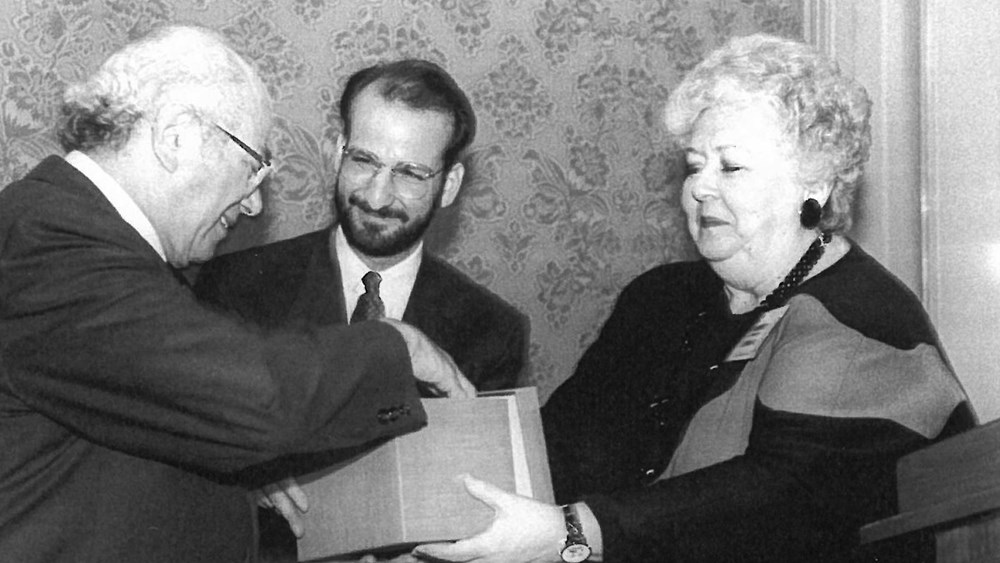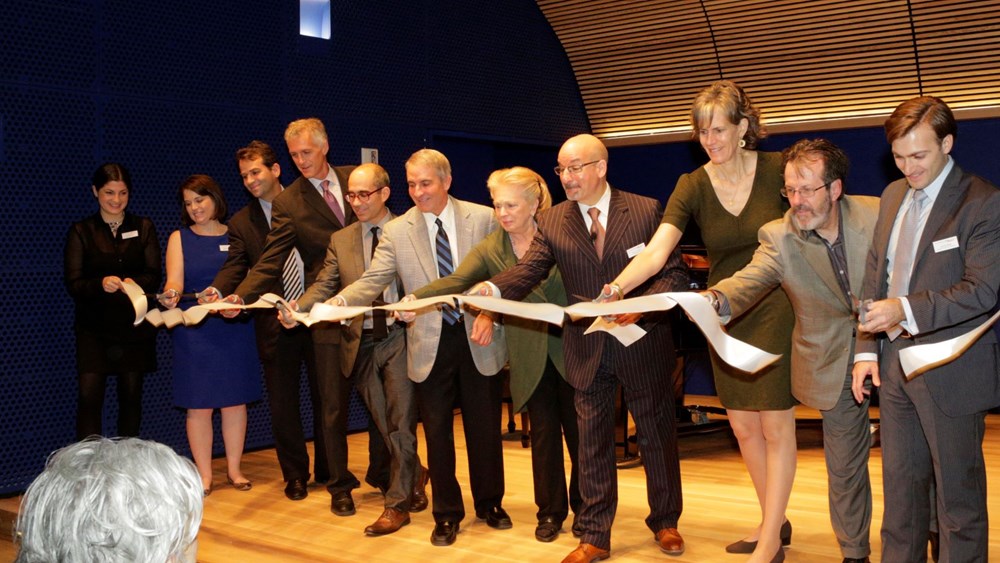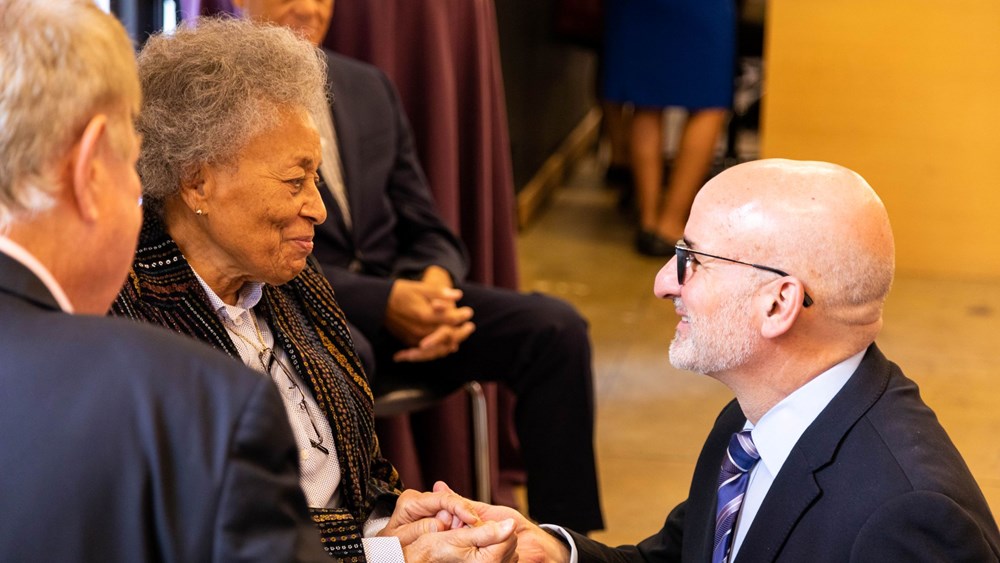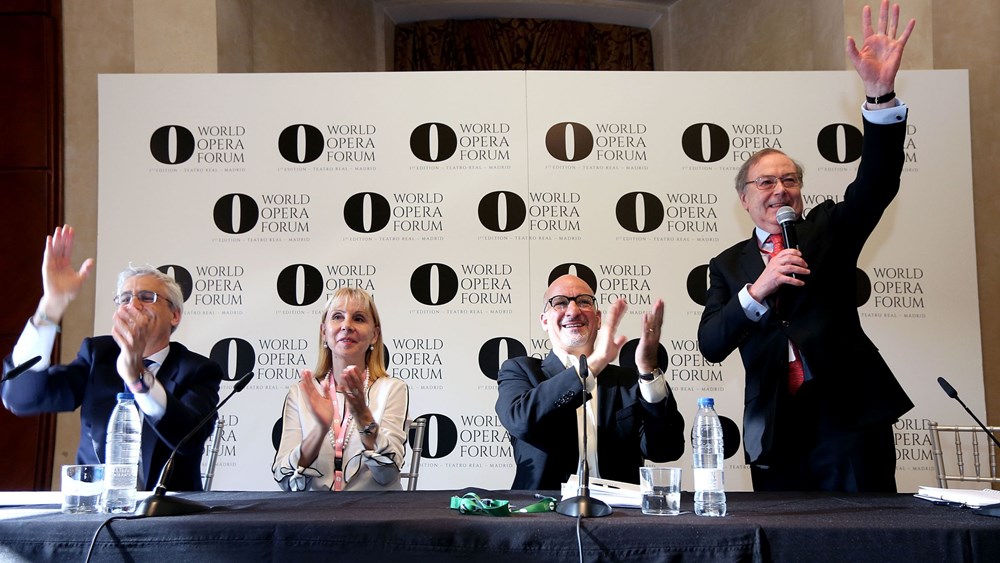Curtain Call: Marc A. Scorca takes his final bow after 35 years
For 35 years, Marc A. Scorca has been “on call.”
Whether opera companies find themselves in the best or worst of times, Scorca, OPERA America’s president and CEO since 1990, has been a constant presence in the field, ready to celebrate triumphs, encourage members, and help diagnose a way forward in times of turmoil. “He’s a surgeon, and one that everybody utilizes differently,” says Khori Dastoor, general director and CEO of Houston Grand Opera. “It’s been comforting to have a physician who has done the procedure before.”
For the opera field at large, things are undeniably tense at present. Scorca makes no pretense about hiding his “profound disappointment” in the state of national arts funding, as the federal government reduces and reprioritizes what little support it gives to the arts. He’s concerned about the long-term ramifications of artificial intelligence on intellectual property. He has questions about companies’ experiments with pricing and discounting structures and how they will impact opera’s business model moving forward.
Nevertheless, there is probably no ideal time for his departure, and he is leaving OPERA America at a time of good standing for the organization. OPERA America’s membership exceeds pre-pandemic levels with nearly 600 organizations, representing more than 40,000 administrators, artists, and trustees, and 3,000 individuals across North America and around the world. The company’s headquarters, the National Opera Center in New York City, has a new lease that runs through 2042. And, as a feather in his cap, he leaves behind a funding apparatus that has disbursed more than $22 million over the course of his tenure for the creation of new opera, as well as for audience building, industry innovations, and civic practice initiatives.
This funding has contributed to a significant increase in America’s output of new operas in recent decades, including banner works that have enjoyed numerous productions. These include operas like Fellow Travelers (Gregory Spears, composer; Greg Pierce, librettist), an opera about the 1950s homosexual witch hunt in the U.S. government; Breaking the Waves (Missy Mazzoli, composer; Royce Vavrek, librettist), a tale of tension between love and a community’s religious values; and El último sueño de Frida y Diego (Gabriela Lena Frank, composer; Nilo Cruz, librettist), which explores the emotions of seeing a departed loved one a final time. The list continues.
While OPERA America has provided crucial funding for innumerable productions, a service organization does not take a bow on opening nights. Much of Scorca’s impact, then, has taken place behind the curtain, discreetly out of view of the public eye. “Running a service organization is not like running an opera company,” says Susan Feder, another giant in the field best known for her work at the Mellon Foundation.

‘He’s our man!’
Cool, analytical, precise, and economical in his words, Scorca grew up in Rockville Centre on Long Island, close enough to access opera in New York as a teenager in what turned out to be a lifelong devotion. Some of his most cherished memories are dream casts he heard in the 1970s, and he went on to experience backstage life at the Metropolitan Opera with a four-year internship extending through every college break in the academic calendar. Scorca’s most formative influence wasn’t standard repertoire, however. His years at Amherst College were occupied partly by a huge independent study of the rates of opera production in the 1780s, when as many as a thousand different operas were performed every year.
Thus, Scorca came to OPERA America in 1990 as a “cultural historian at heart,” he says — one who recognizes that the hundreds of operas that are now forgotten created a world in which masterpieces such as Don Giovanni could be born. “At OPERA America, we protect the right to fail,” says Scorca. “I’m more interested in the rate of productivity than the rate of success. Success is an outgrowth of productivity.”
OPERA America had been founded in 1970 by the late Glynn Ross, who later served as the general director of Seattle Opera and Arizona Opera. Ross’ goal was to address a need for better communication between American opera companies, which had storehouses of scenery, costumes, and other resources that weren’t being effectively shared. Scorca agreed with this vision but believes that collaboration must extend beyond just opera companies: “We can’t have a healthy opera field unless all elements are talking to each other,” he says. “Universities, conservatories, publishers, and artist managements are essential providers of services that have to be connected and working together to have a healthy opera industry.” It was this vision that likely prompted Lyric Opera of Chicago’s longtime leader, Ardis Krainik, who led OPERA America’s search committee for a new leader, to declare, “He’s our man!” when Scorca was appointed CEO.

His single greatest achievement at OPERA America — as widely agreed upon by opera administrators — is the 2012 opening of the National Opera Center, which now welcomes more than 75,000 visitors each year for rehearsals, workshops, auditions, board meetings, and nearly all things operatic. “It gives you that feeling of belonging,” says Beth Morrison, whose Beth Morrison Projects has hosted readings and workshops of new works at the Opera Center. “It’s such an important place for the large community of opera, whether you’re a singer, director, designer, or doing recordings.”
The Opera Center has also become a significant place for the creation of new American works, which was marginal at the start of Scorca’s tenure. Today, “virtually every opera company is producing new and/or existing American opera in almost every season,” says Scorca, who also oversaw the creation of the Mellon Foundation-funded New Works Forum, a fixture at the Opera Center for a decade that provided a space for creatives to showcase works in development to producing companies.
The consummate diplomat
The opera companies that have premiered this new American repertoire come in all shapes and sizes, each rooted in their own unique communities and responding to their own distinctive challenges and programming needs. “In opera, I don’t believe there’s any one business or artistic model. I believe there are many reference points,” Scorca says. “I work with each company to respond to their articulated needs. These might be short-term rescue missions or long-term planning sessions.”
Feder describes Scorca as “the consummate diplomat,” as his style of engagement with members is rooted in deep listening and learning with objective distance before weighing in. If his knowledge of a member company isn’t comprehensive, it will be when he arrives at a seminar or board retreat, right down to local and federal tax policies. Reports on how other companies have fared with similar projects are at his fingertips. He’ll ask open-ended questions and uses “appreciative inquiry” to demonstrate that “many answers to company challenges already are in the room,” he says.

Even his most open-ended suggestions carry authority if only because they’re an outside voice, says Christopher Hahn, general director of Pittsburgh Opera. “He can act as a mirror to what’s going on in the country and the world, which is why I’ve always brought him ... into my work with my board,” Hahn says. But suggestions are not directives or mandates. “If you seek his perspective, he’ll give it to you honestly,” adds Houston’s Dastoor. This approach has earned the respect of company leaders as well as other service organization executives, including Jesse Rosen, who served as the president and CEO of the League of American Orchestras for 22 years. “With member companies, it’s a balance between leading and pushing,” Rosen says. “You can’t get too far in front of your members. But you have to find ways to challenge them. Marc has been very good at working with his members in ways that stimulate and provoke good creative activity.”
Scorca can summon inspirational words when needed, but also dispense practical advice. For example: “Never get ahead of your board,” he told Cincinnati Opera Artistic Director Evans Mirageas, who was specifically shepherded by Scorca into the opera producing world after his successful careers in broadcasting and running Decca Records. Scorca has long advised companies to keep their boards involved in their operations and not to look to members only to rubber-stamp pre-determined decisions. It’s advice he lives up to with OPERA America’s own board — “He calls every OPERA America board member every few months,” says Kevin Smith, who was OPERA America’s board chair from 1997 to 2000 while running Minnesota Opera. “OPERA America’s board has become more involved under Marc. It’s a more powerful partner and entity than 20 years ago.”

The seeds of democracy
As OPERA America’s influence grew, Scorca began turning his interest in collaboration beyond the American opera field alone. He helped to guide the formation of the Association for Opera in Canada in 2001, Opera Europa in 2002, and Ópera Latinoamérica in 2007, all of which have acted as strong partners with OPERA America. He spearheaded the National Performing Arts Conventions of 2004 (Pittsburgh) and 2008 (Denver), which saw more than a dozen national arts service organizations team together to host cross-discipline conferences for thousands of artists, administrators, trustees, critics, educators, and more from across the country. Later, with his international partners, he took OPERA America global with two World Opera Forums in Madrid (2018) and Los Angeles (2024). These forums gathered opera leaders and artists from all over the globe to discuss cross-cultural ideas, strengths, and challenges and to celebrate the multinational nature of the art form’s past and present.
In another Scorca landmark, he recalls going against his own non-interventionist principles: his San Diego Opera rescue mission. During and after the Great Recession of 2008–2009, a number of opera companies had gone down, including Connecticut Opera, Orlando Opera, and the New York City Opera. San Diego Opera’s announcement to close the company in 2014 was a puzzlement, as the company had virtually no debt, though audiences were waning and expenses were rising. Scorca’s reaction to San Diego was visceral: “No, no, no, no — this cannot happen. We cannot stand another one closing.
“I knew there were alternatives,” he continues. “I knew a few board members I could call on, and there began the rescue effort.” A leadership shakeup, a crowd-sourcing fundraiser, and surgical budget cuts ultimately saved the company. San Diego Opera’s next season included the American work Nixon in China (John Adams, composer; Alice Goodman, librettist) as well as the forward-looking Detour series.
Another notable hour came more recently, at the May 2025 OPERA America conference. In response to the current administration in Washington, Scorca quoted from constitutional amendments and made an eloquent case for the importance of opera in the national landscape: “We plant the seeds of democracy every time we offer an education program to expand the horizons of young people and every time we bring opera to libraries, parks, and senior centers. Every time we bring hundreds of thousands of people to theaters, we’re bridging the divides that elected officials are trying hard to create.
“All I can say is... keep going.”
Reporting for this feature is by David Patrick Stearns, a classical music critic and columnist for the Philadelphia Inquirer and a regular contributor to Gramophone, Musical America, and Classical Voice North America.
A fieldwide farewell to Marc will take place at the OPERA America Salutes awards dinner on March 20, 2026. Visit Opera America Salutes for more information.
This article was published in the Fall 2025 issue of Opera America Magazine.






